It’s a week since I returned from my three days in leafy Leicester at the Playful Learning conference. It’s an event I have watched from a distance with envy in previous years, so I was very excited to be able to attend, and to play-test a game Chrysanthi Tseloudi and I developed around accessibility and inclusivity.
Some highlights and useful takeaways:
- Mega games – Darren Green and Liz Cable ran a Climate Crisis mega game: a simulation of negotiations between countries around reducing carbon emissions. This session was for about 20 people but would have scaled well for much larger numbers. It was fascinating and absorbing. You would need some caution about what lessons students would take away – if you asked me what I learnt I’d have to say: China are key to solving the crisis but impossible to work with (which is obviously down to the way the players interpreted their roles) and I’m too gullible (which sadly is not). Even so, I can see real possibilities for this.
- Promoting play in HE – I love the sound of the University of Winchester’s festival of play and creativity. At Bristol we have our Learning Games Lunches a few times a year but a festival allows so much more scope to innovate, play test, and to take ideas directly to and from the students.
- Play for all – There were differing views around whether play had to be voluntary or not, which is obviously an important issue if you are trying to incorporate play within HE, and particularly within the taught curriculum. Reflecting on the kinds of sessions at the conference that worked well for me, and those that didn’t quite, I’m increasingly persuaded that you can only invite people to play and you can’t require them. Maybe providing choice within a set of playful options, so that people retain a sense of ownership or control, would be enough.
I was expecting – hoping I suppose – the conference would introduce me to new game mechanics for use in teaching, and maybe some facilitation ideas. In the end, the more significant focus for me was around wellbeing. It can be too easy to feel invisible and without agency, not part of anything. At Playful Learning everything was very active and collaborative. For three solid days I felt both seen and heard (a phrase which sounds rather corny to my ears but I can’t think of a more accurate one to describe the feeling). Being so connected was hard work at times but a very positive experience.
The idea of play as an indicator of wellbeing was introduced in by Alison James in her keynote. She mentioned that animals who are sick or scared can’t play. I now wonder how much play can promote or amplify wellbeing. Can behaving in a playful way sometimes trick you into being more well? I’m reminded of the work of Clowns Without Borders, taking laughter to children who you might imagine couldn’t benefit.
By the time Friday morning came and it was our turn to present, my feeling was that we were addressing a room of supportive friends. Not people who would never criticise, we got some very useful criticism, but friends all the same. This building of community and connection – both for students and staff – is a key thing that playfulness and games could bring to universities.
(Yellow-team-lego photo shamelessly stolen from @malcolmmurray – but myself and two mysterious strangers (or people whose names I have forgotten) built the thing so I’m hoping that’s ok.)
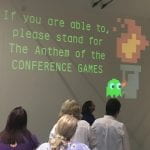
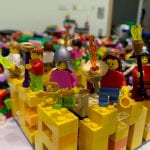
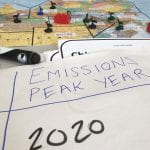

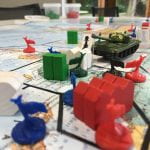
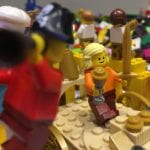
I





